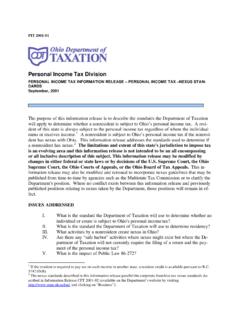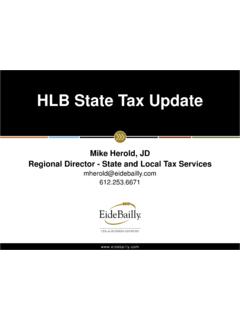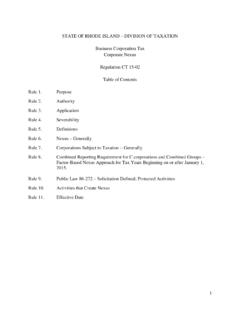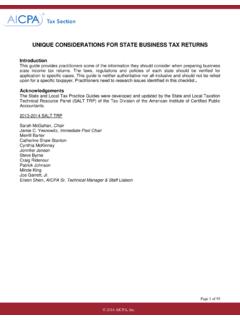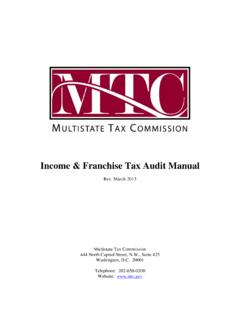Transcription of Michigan Corporate Business Tax - Maner CPA
1 2011 Wolters Kluwer. All rights reserved. Michigan Corporate Business Tax & Michigan Individual Tax Changes Michigan Gov. Rick Snyder has signed legislation to adopt a Corporate income tax and substantially revise the personal income tax by lowering the rate, curtailing deductions and exemptions, and eliminating credits. The Corporate income tax is effective January 1, 2012, and the Michigan Business tax is repealed after all certificated credits and any carryforward have been claimed. Highlights of the changes are discussed below.
2 Tax Rate The Corporate income tax is imposed at a rate of 6%. Corporations and unitary Business groups are subject to the tax. Unlike the Michigan Business tax, S corporations and other pass-through entities, such as limited liability companies, are not subject to the Corporate income tax. Nexus Standard The Corporate income tax is imposed on every taxpayer with Business activity within Michigan unless prohibited by 86-272. A taxpayer has substantial nexus in Michigan if: the taxpayer has physical presence in Michigan for more than one day; the taxpayer actively solicits sales in Michigan and has $350,000 or more of gross receipts attributable to state sources; or the taxpayer has an ownership interest or a beneficial interest in a flow-through entity that has substantial nexus in Michigan .
3 Income Tax Computation The Corporate income tax base is federal taxable income subject to the following addition and subtraction adjustments: bonus depreciation is added back; the federal domestic production activities deduction is added back; interest and dividends from other states' obligations are added back; taxes measured by net income are added back; net operating loss carrybacks or carryovers are added back; dividends and royalties received from persons other than persons and foreign operating entities may be deducted; royalty, interest, or other expenses paid to a related person for use of an intangible asset if the person is not included in the taxpayer's unitary Business group are added back; interest income from obligations may be subtracted; and 2011 Wolters Kluwer.
4 All rights reserved. for tax years beginning after 2011, income and expenses from producing oil and gas subject to the severance tax are eliminated. With the exception of the oil and gas income and expenses adjustment, these adjustments are substantially similar to those made under the Michigan Business tax. After apportionment, the Corporate income tax base may be adjusted by deducting any Business loss incurred after December 31, 2011. Michigan adopts the Internal Revenue Code in effect on January 1, 2012, or, at the taxpayer s option, in effect for the tax year.
5 Apportionment The Corporate income tax base is apportioned using a 100% sales factor. The following are deemed to be Michigan sales: sales of tangible personal property if the property is shipped to a purchaser in the state; receipts from the sale or lease of real property if the property is located in Michigan ; receipts from the lease or rental of tangible personal property to the extent that the property is used in Michigan ; receipts from the performance of services to the extent that the recipient of the services receives the benefit in Michigan .
6 Receipts from the origination of a loan secured by residential real property if the real property is in Michigan , or more than 50% of the fair market value of the property is in Michigan , or the borrower is located in Michigan ; interest from a loan not secured by real property if the borrower is located in Michigan ; receipts from credit card receivables if the billing address of the card holder is in Michigan ; and loan servicing fees derived from loans of another person that are secured by real property if the real property is in Michigan , or more than 50% of the fair market value of the property is in Michigan , or the borrower is located in Michigan .
7 The law includes additional specific sourcing provisions for certain receipts. All other receipts are sourced depending on where the benefit to the customer is received or, if this cannot be determined, to the customer's billing address. These provisions are similar to those under the Michigan Business tax. Combined Returns Unitary Business groups are required to file combined tax returns. All transactions between taxpayers in a unitary Business group must be eliminated from the Corporate income tax base and the apportionment formula.
8 A unitary Business group is a group of persons, other than a foreign operating entity, one of which owns or controls more than 50% of the ownership interest of the other persons and has Business activities that result in a flow of value between the persons in the group. The Business activities may also be integrated with, dependent upon, or 2011 Wolters Kluwer. All rights reserved. contribute to the other persons in the group. These provisions are similar to those under the Michigan Business tax. Credits Small businesses: Taxpayers with gross receipts that do not exceed $20 million and with adjusted Business income that does not exceed $ million may claim a credit equal to the amount by which the tax exceeds of adjusted Business income.
9 The credit is phased out based on a sliding scale for compensation ranging from $160,000 to $180,000. This provision is similar to one under the Michigan Business tax. Certificated credits: Taxpayers with certificated credits have the option to claim those credits and pay the Michigan Business tax. This is in lieu of the Corporate income tax, and the taxpayer must choose for its first tax year ending after 2011. If filing and paying the Michigan Business tax, the taxpayer must continue to do so until the certificated credit(s) and any carryforward are used up.
10 A "certificated credit" includes credits for the early stage venture capital investment program, brownfield plans, film production expenditures and infrastructure projects, historic preservation, Renaissance Zones, Michigan Economic Growth Authority credits, anchor companies, and several advance automotive engineering and manufacturing credits, among others. The Michigan Business tax is repealed when the last certificated credit and any carryforward has been claimed. Other Business Tax Changes Insurance companies: Insurance companies are subject to a tax at the rate of on gross direct premiums.
